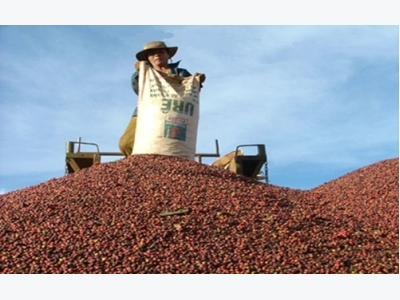Vietnams coffee industry relies on merchants

There are 150 coffee export companies and over 3,000 merchants who collect coffee beans from farmers to sell to roasters and exporters.
Merchants act as a bridge between farmers and enterprises, playing a very important role. However, observers pointed out that merchants eat up most of the profit of the supply chain, while farmers pocket modest money.
In many cases, farmers cannot get payment for the coffee they sell if merchants later declare default.
Only 10 percent of coffee made by farmers can be sold directly to large corporations, while the remaining 90 percent is collected by intermediary merchants.
According to Nguyen Viet Vinh, chair of the Vietnam Cocoa and Coffee Association (Vicofa), 94.5 percent of farmers are part of the coffee chain. They harvest 3-5 tons of coffee beans from every hectare of coffee plants, but make insignificant profits. Meanwhile, merchants and intermediaries can make fat profits.
Vinh said both farmers and companies understand that they face high risks when selling/collecting coffee beans through intermediaries, while exporters are encouraged to collect coffee beans directly from farmers.
However, large exporters all say that they cannot ‘escape’ merchants and intermediaries.
Vicofa said the corporate governance capability of most coffee processing and export companies remains unprofessional, and they are cannot collect coffee directly from farmers.
Ninety Vietnamese companies and 100 percent of foreign invested enterprises collect coffee beans through merchants and this is why export coffee quality is not high.
A survey conducted by IDH, the Sustainable Trade Initiative, found that only 10 percent of coffee made by farmers can be sold directly to large corporations, while the remaining 90 percent is collected by intermediary merchants.
Unlike coffee growers’ communities in Brazil and Ethiopia, Vietnamese farmers grow coffee on a small scale on small areas. Therefore, it is impossible to collect products on a large scale, while exporters have to totally depend on merchants, who live in localities and understand the production and harvesting schedules.
Since coffee output is large, most coffee growers want to sell fresh coffee beans. Therefore, only merchants can connect coffee growers and the market.
If merchants did not exist, coffee could not be sold in a convenient way, because coffee companies don’t have enough workers and money to come to coffee gardens to collect beans.
An expert said that instead of calling to eliminate intermediary merchants, it would be better to take full advantage of the force.
Merchants not only collect coffee beans from farmers and provide them to exporters, they also provide fertilizers, seedlings and pesticides to farmers under the mode of referred payments.
Thanks to them, farmers do not have to borrow money from ‘black creditors who lend money at exorbitant interest rates.
However, cooperation among farmers, merchants and exporters needs to be done in a way that would bring reasonable profits to involved parties.
Có thể bạn quan tâm
 Hau Giang props up investment in hi-tech agriculture
Hau Giang props up investment in hi-tech agriculture The Mekong Delta province of Hau Giang is in need of investments totaling US$50 million in a 5,200-hectare hi-tech agriculture zone.
 Growers step out with new pumpkin variety
Growers step out with new pumpkin variety AUSTRALIANS can add a fresh flavour to their favourite pumpkin soup or roast dinner recipe after a new pumpkin variety was launched at Coles thanks to two
 Vietnam ships first batch of dragon fruit to Australia
Vietnam ships first batch of dragon fruit to Australia Việt Nam is the first and only country having been licensed by Australia to export dragon fruit to the country after years of negotiations